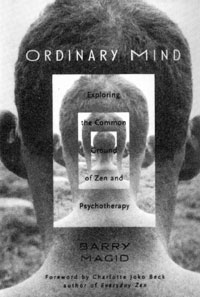 Ordinary Mind:
Ordinary Mind:
Exploring the Common Ground of Zen and Psychotherapy
By Barry Magid
Wisdom Publications; Boston 2002
208 pp.; $22.95 (cloth)
Americans have never been much for either/or. When presented with choices, and especially when operating as consumers (which is to say, most of the time), we tend to exhibit a hungry kind of both/and pluralism, a desire to Cover all the bases. Our country is, after all, the home of edutainment, coopetition, yogilates, and the beefalo.
Ponder this trait alongside our national urge for self-betterment, and it’s no surprise that recent years have seen the publication of so many attempts to fuse various strains of Eastern and Western thought. While some of these books read like cross-training manuals for the spiritual athlete, several serious, thoughtful entries have taken a more nuanced approach, bringing this dual perspective to bear on the psychic flutterings that underlie our daily experience. Barry Magid, a psychiatrist and psychoanalyst and a longtime student of Zen, is one of those writers working to marry—or at least reconcile—silent meditation and the talking cure.
Magid’s addition to the literature revolves around a simple premise: “Practice may utterly transform our lives in one dimension, while much about who we are in other ways may not change at all.” As he expands on this theme, it becomes clear that he’s not really searching for common ground, which he takes as a given. Rather, he’s intent on mapping the terrain in a way that illustrates most vividly just how psychotherapy can facilitate and deepen the practice of Zen. Indeed, his arguments and anecdotes are mostly aimed at correcting common misapprehensions about both Zen and therapy, and at questioning the extent to which “just sitting” can help us unpack the baggage of a Western upbringing. It’s as if the author, seated confidently atop his
“Part of the mythology of Zen, when I began my practice,” he writes, “was that enlightenment experiences somehow would spontaneously dissolve all neurosis and that one would emerge from them cleansed of all past conditioning. Nowadays increasing attention is being paid to what might be called ‘post-enlightenment practice.”’ And further on: “A psychologically minded practice keeps us attuned not only to our usual reactions to routinized work but to our deeper expectations of how we feel or think about
ourselves, all of which provoke resistance to staying with the moment’s activity.” (Anyone who doubts the value of what Magid is recommending here should see Michael Downing’s recent Shoes Outside the Door, a riveting chronicle of interpersonal dysfunction at San Francisco Zen Center.)
In 1996 Magid was granted permission to teach the dharma by his own teacher, Charlotte Joko Beck. That same year, he opened a zendo next door to his Manhattan office; he now leads weekly group meditation sessions and regular intensive retreats-attended by, among others, a number of his current and former patients. Borrowing from talks given at these gatherings, he has interspersed throughout Ordinary Mind his commentary on a handful of koans, and here and elsewhere he displays a fine appreciation for the enigmatic, and a subtle grasp of the way words, under close scrutiny, can become elusive.
This is especially apparent when he is considering the wildly divergent ways in which Western and Eastern traditions view such concepts as self and emptiness. Talking about one of the towering figures in his psychoanalytical lineage, Magid refers to Heinz Kohut’s recognition that among certain patients, “subjective feelings of emptiness correlated with a failure to develop or sustain a stable, cohesive self.” Of course, Magid explains, these feelings are merely those of an inner vacuity, and not some privileged realization about the essential nature of existence. And what about the “failure to develop or sustain a stable, cohesive self”? “Breakdowns,” he wisely cautions, “are not breakthroughs.”
Though repetitive at times, Magid’s writing is unfailingly insightful and clear, and his evident faith in the rewards of patient, steady effort—whether in the meditation hall or the consultation room—is inspiring. In the end, he makes a convincing case for the sort of “ordinary” mind that is neither woefully unsuperlative nor merely average, but supple and marked by uncomplicated ease…
Thank you for subscribing to Tricycle! As a nonprofit, we depend on readers like you to keep Buddhist teachings and practices widely available.